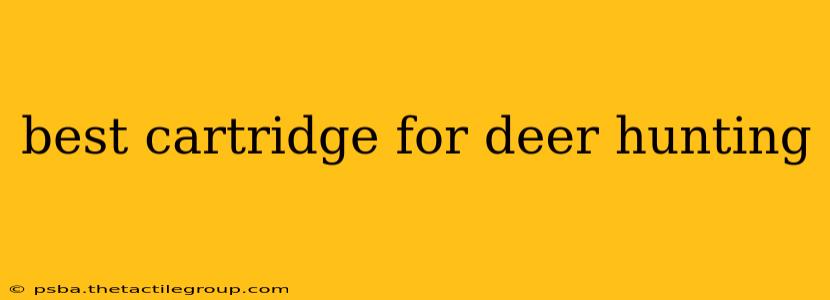Choosing the right cartridge for deer hunting is a crucial decision impacting your success and ethical hunting practices. This isn't a one-size-fits-all answer; the ideal cartridge depends on several factors, including the type of deer you're hunting, the terrain, your shooting skills, and personal preferences. This guide explores popular choices, their pros and cons, and helps you make an informed decision.
Factors to Consider When Choosing a Deer Hunting Cartridge
Before diving into specific cartridges, let's examine the key factors influencing your choice:
- Deer Size and Type: A large whitetail buck demands a more powerful cartridge than a smaller mule deer or a lightweight antelope. Larger calibers offer more stopping power.
- Shooting Distance: Longer shots require flatter-shooting cartridges with less bullet drop. Accurate shot placement is paramount, so consider your proficiency at longer ranges.
- Terrain: Dense forests require cartridges with less recoil, allowing for quicker follow-up shots. Open plains offer greater distances and may benefit from flatter-shooting, longer-range cartridges.
- Personal Preference and Experience: Your comfort level with recoil, the feel of the rifle, and your experience with specific calibers play a significant role. Choose a cartridge you can shoot accurately and consistently.
- Ethical Hunting Practices: Choosing a cartridge with sufficient stopping power ensures a clean, humane kill. Overpowering a deer with an excessively powerful cartridge is unnecessary and unethical.
Popular Deer Hunting Cartridges: A Detailed Look
Several cartridges consistently prove effective for deer hunting. Let's explore some top contenders:
.30-06 Springfield:
- Pros: Excellent all-around cartridge, powerful enough for most North American deer species, readily available ammunition, relatively affordable. Good for longer ranges.
- Cons: Significant recoil, may be overkill for smaller deer.
.308 Winchester:
- Pros: Less recoil than the .30-06, flatter trajectory, excellent accuracy, widely available ammunition. A popular choice for its versatility.
- Cons: May not offer the same stopping power as the .30-06 at longer ranges.
.270 Winchester:
- Pros: Flat trajectory, excellent accuracy, manageable recoil, suitable for various deer species. A favorite among many hunters for its balance of power and accuracy.
- Cons: Slightly less stopping power than the .30-06 at closer ranges.
6.5 Creedmoor:
- Pros: Excellent accuracy, long range capabilities, less recoil than the .30-06 or .270, efficient in its use of ammunition. Increasingly popular among hunters seeking a balance of power and recoil management.
- Cons: May require more precise shot placement compared to larger calibers.
.243 Winchester:
- Pros: Low recoil, suitable for smaller deer, excellent accuracy at moderate ranges, good choice for beginners or those sensitive to recoil.
- Cons: Not ideal for larger bucks or longer shots; limited stopping power compared to larger calibers.
Beyond the Calibers: Ammunition Selection
The choice of ammunition is as crucial as the cartridge itself. Consider bullet type (e.g., soft point, expanding, bonded) based on the game you are hunting and your personal preference. Always prioritize ethical hunting practices by selecting ammunition designed to expand reliably within the animal, ensuring a quick and humane kill.
Conclusion: The Best Cartridge is Personal
Ultimately, the "best" cartridge for deer hunting is subjective. It hinges on individual factors and priorities. Research thoroughly, consider your needs, and perhaps even try out different calibers at a shooting range before making your final decision. Remember to prioritize safe and ethical hunting practices above all else. Consult experienced hunters and seek professional guidance if needed. Enjoy the hunt!

